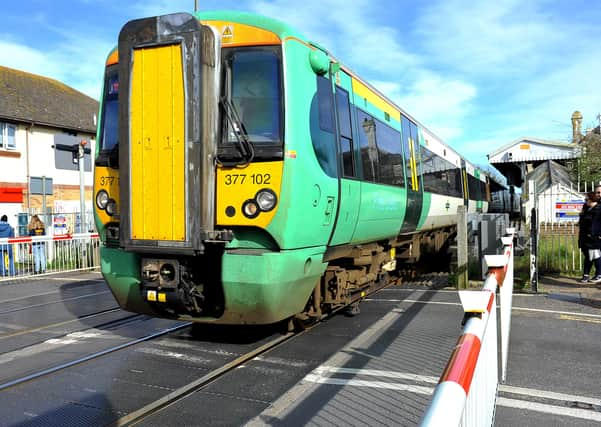Flexible train season tickets included in rail reforms


A new public body Great British Railways (GBR) is set to be created to integrate the railways, own the infrastructure, collect fare revenue, run and plan the network and set most fares and timetables.
GBR will contract private partners to operate most trains to the timetables and fares it specifies, with a model similar to that used by Transport for London in Overground and Docklands Light Railway services.
Advertisement
Hide AdAdvertisement
Hide AdThe Government says it will simplify the current mass of confusing tickets with new flexible season tickets on offer for people commuting part-time given the increase in home working due to the pandemic.
The new national flexible ticket will be on sale on 21 June, for use by 28 June.
The paperless tickets will allow travel on any eight days in a 28-day period, with passengers able to tap smartcards or scan mobiles at the station, with no need to select the days of travel in advance.
Transport Secretary Grant Shapps said: “For many, the idea of travelling five days a week to the office is fast becoming a relic of the past. The future is flexible: passengers want a simple, stress-free option, and new flexible tickets make fares fairer.”
Advertisement
Hide AdAdvertisement
Hide AdMinisters pledged that GBR would work closely with communities on designing services with local leaders given greater control over ticketing, timetables and stations.
The rail industry reforms were welcomed by Transport for the South East, but the organisation has also argued that decisions about rail investment and services in the region must be informed by those who know it best
Keith Glazier, chair of TfSE, said: “The South East has always relied on rail more than any region outside London.
“Getting our economy back on track and hitting our net zero carbon targets can only be achieved if we build on that legacy and put rail at the heart of a joined-up regional transport system. We know that continuing to cater for ever-rising car use in the South East is simply not an option if we’re to deliver the future we want. A better rail network can reduce congestion on our roads, improve air quality and safety in our towns and cities and boost connectivity and drive sustainable economic growth for people and businesses across the South East.”
Advertisement
Hide AdAdvertisement
Hide AdThe government says that GBR will drive significant efficiencies in the railways’ inflated costs, reducing complexity and duplication, increasing flexibility, changing working practices and making it easier and cheaper to invest.
Patrick Verwer, chief executive officer at Govia Thameslink Railway, which runs Southern, Thameskink and Gatwick Express services, said: “We will continue to work in collaboration with the Department for Transport, Network Rail and industry partners to deliver a better customer proposition, as laid out in the Williams-Shapps review and to support the Government’s recovery agenda.
“Over the past year, we have played a critical role in supporting key workers with their journeys, and we continue to focus on keeping our passengers and colleagues safe.
“Customers tell us that better access to real-time information, more flexible and smarter payment options, and simpler fares are at the top of their rail travel priorities.
Advertisement
Hide AdAdvertisement
Hide Ad“During this time, we have already been working hard to provide new solutions including more intuitive travel information, introducing e-ticket readers at stations and creating new tools to help passengers choose the quietest times to travel.
“Our current focus remains on working in partnership with the DfT to deliver the requirements of our ERMA contract and encouraging people back to their local train services. This recovery will help by protecting the environment, boosting economic recovery and supporting the prosperity of our regions.”
Robert Nisbet, director of nations and regions at the Rail Delivery Group, said: “The pandemic has recast how and where people work, which is why we’ve worked with government to introduce new season tickets that will give commuters the freedom and flexibility to divide their time between home and the office. New flexible fares will be key to getting people back on to trains, supporting the country’s economic and environmental recovery.
“Flexi Season tickets are a step in the right direction, but to really maximise the benefits and make it easier for people to get good value fares requires government to go further and get under the bonnet to fix the engine of the fares system.”
Advertisement
Hide AdAdvertisement
Hide AdBut the announcements did not go down as well with the rail unions.
RMT general secretary Mick Lynch called it a ‘missed opportunity’ by the Government to ‘make a clean break from the failures of the past that have left Britain’s railways in the slow lane’.
He added: “If the Government were serious about recognising the impact of failed rail policy down nearly three decades they would cut out the middleman, strip away the dead weight of the private companies and work with their staff on building a transport system fit for the future where investment in the workforce and infrastructure comes first.”
Meanwhile Transport Salaried Staffs’ Association general secretary Manuel Cortes said: “Rather than take the bold action that our rail network desperately needs this is an attempt merely to paper over the cracks.”